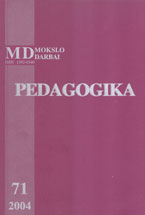Ikimokyklinio ugdymo pedagogų prefesinės kompetencijos kaip tęstinio profesinio mokymo(si) funkcija: kompetencijų modelio įgyvendinimas, įvertinimas
Early Childhood Teachers' Professional Competencies as a Function of Continuous Professional Education: Implementation and Evaluation of the Model
Author(s): Elena Jurasaite-HarbisonSubject(s): Education
Published by: Vytauto Didžiojo Universitetas
Summary/Abstract: Teachers need to re-create their role to suit new situations and relationships in Lithuania; teacher educators - create approaches and methods allowing teachers make a transition. Teacher competencies in this context come into the center of reform. The study analyzes meaning and models of teachers' professional competencies in a broad theoretical context and identifies diversity of competencies' representation in the system of early childhood education in Lithuania. The empirical analysis of dynamics and interrelations between different early childhood teachers' competencies in the context of teachers' self-evaluation of their values, dispositions and beliefs (survey research method) suggests that early childhood teachers in Lithuania as subjects of the educational process participate in the changing processes of the society and tend to implement the humanistic approach in education. They effectively introduce innovations that require their competence change and encourage their further professional development. The occurring competence change is different depending upon the teachers' education (higher pedagogical, high pedagogical, and other), territory (university cities, regional centers, and other towns and villages), years of experience, and the intensity and variety of professional development courses. Thus, teachers have different social and professional experience. Therefore, competencies of teachers that implement state curriculum "Vėrinėlis" and an experimental child-centered approach ("Step by Step") develop differently. The significance is demonstrated in the possibility to apply the created model for developing professional standards for early childhood educators in Lithuania that could serve as educational goals preparing early childhood teachers and as criteria for their certification. The study provides a model of early childhood teachers' professional competence that should become a foundation for pre-service and in-service curriculum in teacher education institutions.
Journal: Pedagogika
- Issue Year: 2004
- Issue No: 71
- Page Range: 56-65
- Page Count: 10
- Language: Lithuanian

